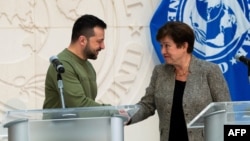The International Monetary Fund's executive board on Monday approved a $900 million disbursement for Ukraine as part of an ongoing long-term loan, leading Ukrainian President Volodymyr Zelenskyy to thank the IMF for “supporting” the embattled country.
"Thank you for supporting Ukraine and celebrating the successes of our country and our people," Zelenskyy said on his Telegram channel after his meeting with IMF chief Kristalina Georgieva in Washington.
Georgieva said Ukraine's economy had proven resilient despite Russia’s invasion in February 2022.
"Looking ahead, whereas the recovery is expected to continue, the outlook has significant risks stemming mainly from the exceptionally high war-related uncertainty," Georgieva said in a statement, according to Reuters. "It is also critical that external financing on concessional terms continue on a timely and predictable basis."
The IMF on Monday asked Ukraine to conduct an "ambitious" external commercial debt restructuring in the first half of 2024 to help restore debt sustainability.
Earlier Monday, Zelenskyy received a standing ovation at the National Defense University after he addressed U.S. military officers, kicking off a visit to Washington aimed at persuading Congress to provide more military aid to Ukraine before funding runs out.
In his speech, Zelenskyy emphasized the importance of defeating Russia in Ukraine, saying that if Moscow won, Russian President Vladimir Putin would not stop there.
"His [Putin’s] weapon against you right now is propaganda and disinformation. But if he sees a chance, he'll go further,” he said. “Now, he's shifting Russia's economy and society [onto] what he calls ‘war tracks.’ "
The Ukrainian president said that so far, Ukrainian forces have taken back 50% of the territory they lost to Russia, and he pointed to the perseverance of Ukrainian “warriors” on the battleground.
“Right now, amid fierce battles, our soldiers are holding positions on the front and preparing for further actions, and we haven't let Russia score any victory this year,” Zelenskyy said.
In his remarks at the National Defense University, U.S. Secretary of Defense Lloyd Austin maintained that U.S. support in Ukraine was unshakeable and warned, "If we do not stand up [to] the Kremlin's aggression today, if we do not deter other would-be aggressors, we will only invite more aggression, more bloodshed and more chaos.
“Now, despite his crimes and despite his isolation, Putin still believes that he can outlast Ukraine, and that he can outlast America. But he is wrong."
Zelenskyy is expected to visit Capitol Hill on Tuesday and to meet with President Joe Biden at the White House.
Biden has asked Congress for a $110 billion package of wartime funding for Ukraine and Israel, along with other national security priorities. Ukraine would get over $61 billion of the money.
But Republicans in the U.S. Senate have balked at the legislation, saying major U.S. border security changes are needed.
Some Republicans are asking for the immediate deportation of illegal migrants, stripping them of a chance to seek U.S. asylum. They have also called for greatly scaling back Biden administration programs that have allowed hundreds of thousands of migrants to enter the U.S. lawfully.
The U.S. has already provided Ukraine $111 billion for its fight against Russia's invasion.
Russian submarines
In a televised ceremony on Monday, Putin inspected two nuclear submarines — the Krasnoyarsk and Emperor Alexander III — at the Sevmash shipbuilding yard in the Arctic port of Severodvinsk.
The Emperor Alexander III is part of Russia's new Borei (Arctic Wind) class of nuclear submarines, the first new generation Russia has launched since the Cold War.
Last month, the Defense Ministry said the vessel had successfully tested a nuclear-capable Bulava intercontinental ballistic missile.
Security analysts say nuclear arms have assumed a greater importance in Putin’s thinking and rhetoric since the start of the Ukraine conflict, where his conventional forces are locked in a grinding war of attrition with no end in sight.
VOA’s Carla Babb contributed to this report. Some information came from The Associated Press, Agence France-Presse and Reuters.







